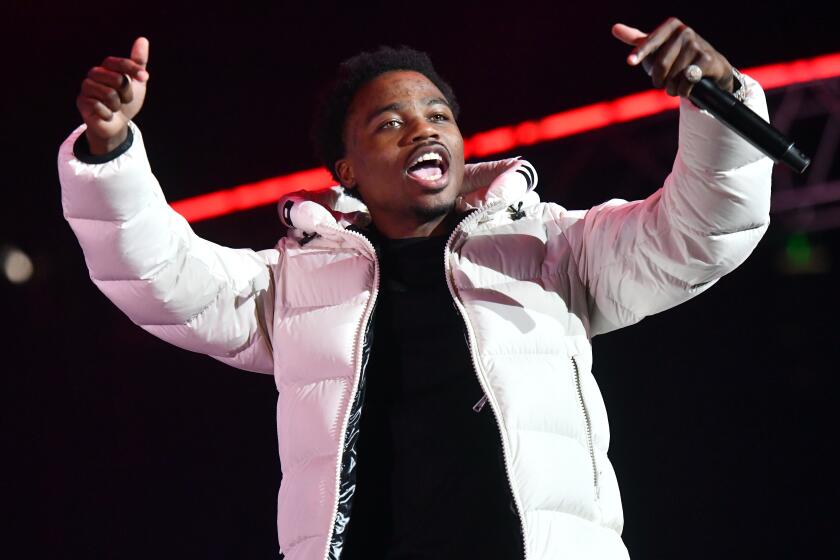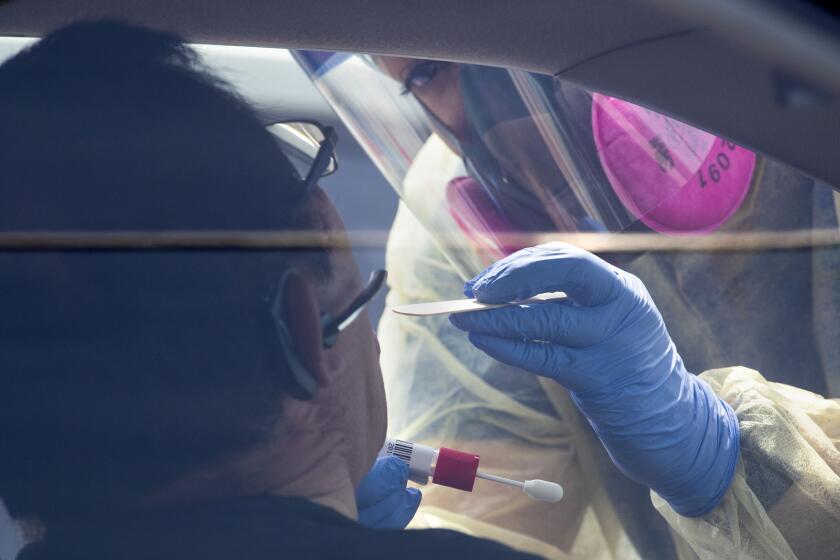First gentrification, now a pandemic. Can Highland Park’s fabled music scene survive?
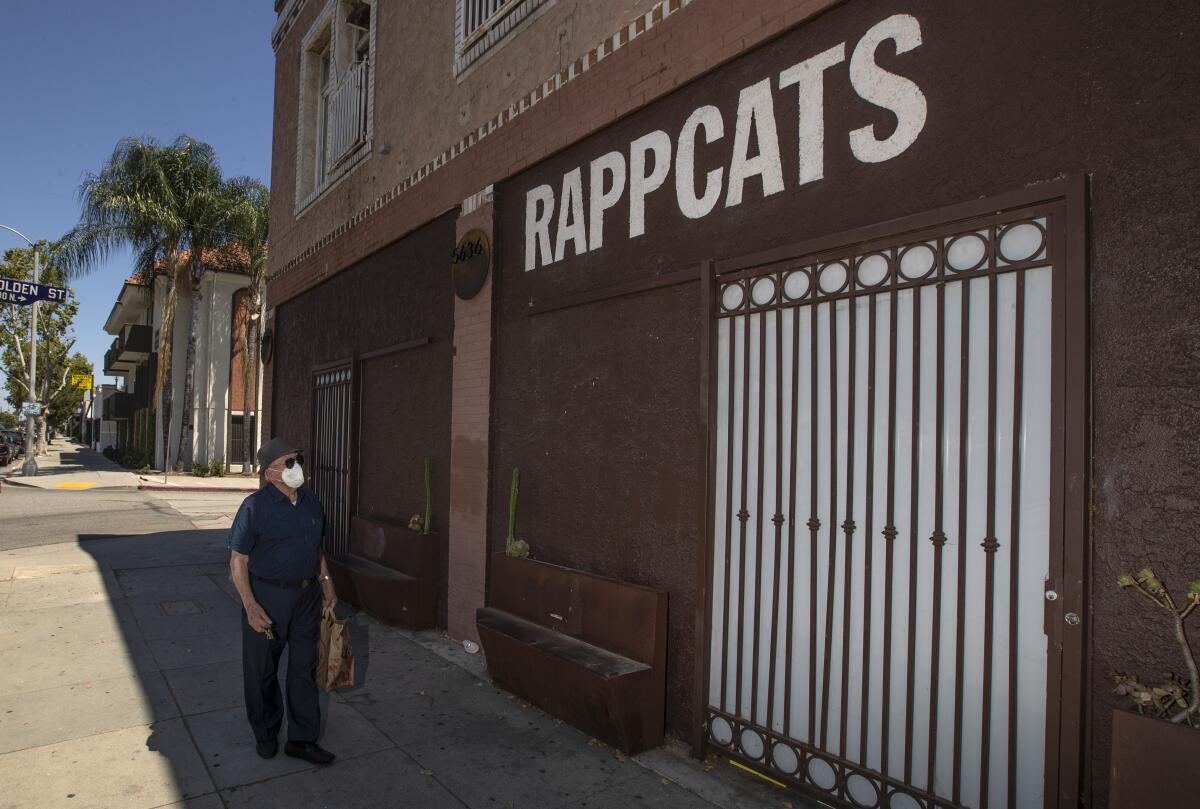
- Share via
On March 7, Ryan Pollie threw the inaugural Highland Park Folk Festival, a free concert and comedy show held under the winsome tree canopy at Tierra de la Culebra Park. The show from the singer-songwriter (a resident of next-door Eagle Rock, and signed to powerhouse L.A. indie ANTI- Records) drew around 300 people to see more than a dozen local acts and comedians.
It was, as the 31-year-old Pollie described, “one of the best days of my life, that a show like that could be feasible in one of the most beautiful places to live in the world.”
Just four days later though, COVID-19 hit and local music got walloped. “There was no sense of what was coming. We had no idea of the effect it would have on our lives,” Pollie said.
Nielsen Music’s midyear report shows hip-hop and R&B dominate the streaming market, and albums by men account for nine of 2020’s 10 biggest records so far.
Highland Park, bordered by the 110 Freeway, the Arroyo Seco, Mount Washington and Eagle Rock, is one of the most influential neighborhoods for music in the United States. Home to over 60,000 people, it’s known for its fetching Craftsman and Mission Revival homes, a blend of urbanity and nature, and a century of arts and bohemia. Since the turn-of-the-20th-century Arts & Crafts movements of stained-glass maker William Lees Judson and journalist-activist Charles Lummis, the neighborhood has prized independent arts. In the ’70s, the Mechicano Art Center and Centro de Arte Publico made the neighborhood “a super-revolutionary Chicano town,” as artist Richard Duardo told The Times in 2012. Rage Against the Machine’s Zack De La Rocha had a longtime arts center there, Regeneracion, and Cafe NELA, just next door in Cypress Park, helped made it a Latin punk-rock haven.
Just a few months ago, you could shop for techno rarities at Mount Analog and catch indie bands or pro wrestling at the Hi-Hat; walk to an ambient chill-out in the park and get your guitar fixed by a salty old pro at Future Music; or catch a neighbor’s backyard bachata ensemble and pop into a jazz jam at ETA. Beck and Skrillex have lived and grown up there. Jay Z threw his launch party for Tidal at Fig House. Morrissey reportedly shoots pool at Johnny’s Bar. Even during the lockdown, born-and-raised Highland Park-er Billie Eilish joined hundreds in the streets for Black Lives Matter protests.
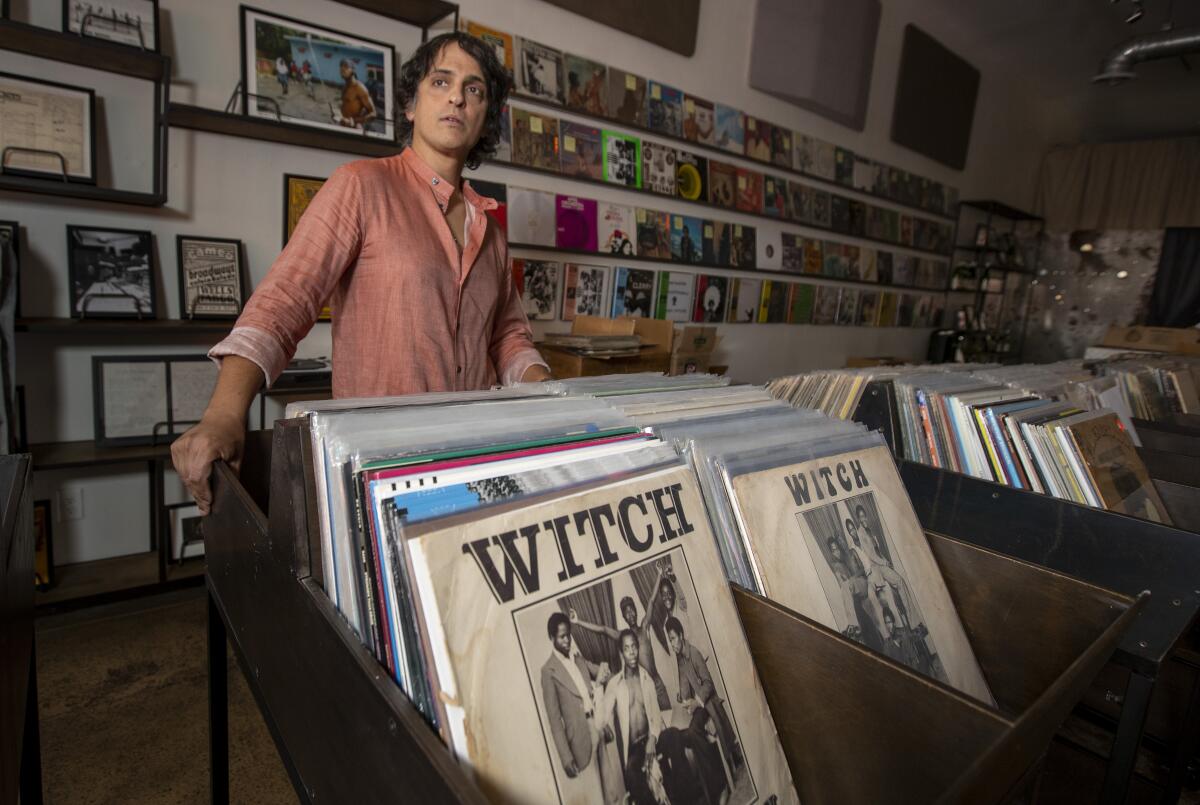
But the neighborhood, once Redfin’s hottest in the county, has also been ransacked by gentrification and real-estate speculation, much of it sold on the promise of one arts community at the expense of another that’s been around for decades.
COVID-19 has closed or upended almost everything, gentrified and old-school alike. The neighborhood has lost an estimated 3,236 jobs, almost 17% of its labor force, during the pandemic. The now-shuttered Hi-Hat’s building is up for sale and may not return. Even well-heeled newcomers like the Lodge Room have been laid low. With rent due, businesses closed and pandemic benefits expiring this month (and PPP loans still complicated for independent contractors), COVID-19 could be an arts apocalypse.
Will the pandemic simply exacerbate class divides and gut independent venues? Or will it prompt a re-think of how (and for whom) a neighborhood defines its cultural life?
“There are benefits to living in a neighborhood with a bunch of recording studios around the corner,” Pollie said. “But if there’s only that, you’d live in a bubble. I just went by a socially distanced birthday party with a mariachi band, and everyone was driving by to say happy birthday. There was still music in the air.”
To get a sense of the neighborhood’s future as an independent music hub, The Times talked to a range of artists, shop owners and activists about the toll — and maybe the potential — of life during and after COVID-19.
The first concern, shared by nearly everyone in L.A., is if residents and independent businesses will be able to afford rent as the pandemic and its unemployment crisis drags on.
“You see a correlation between gentrifiers maintaining their income, and lower-income people losing it,” said Paavo Monkkonen, a professor of urban planning and public policy at UCLA. “All small businesses operate on thin margins. But newer businesses catering to hipsters have the time and savings to wait. That’s a big problem for people who have long been living in the neighborhood.”
Since Americana singer Margo Price recorded her new album in L.A., her husband contracted COVID-19, delaying the record’s release.
One of them, Jessica Ceballos y Campbell, is an Afro Mexican activist and writer who has lived in Highland Park and Northeast L.A. for most of the last four decades. She has served on the Highland Park Neighborhood Council and chaired its arts committee, and hosts a chapter of the Los Angeles Tenants Union at the beloved arts space Avenue 50 Studio. She’s also worked for record labels like American Recordings, Michael Ovitz’s Artists Management Group, and was the resident poet at the goth techno club Cloak & Dagger.
For her, the pandemic is a new twist on an old story of making do on the margins.
“A lot of old-school artists in Northeast L.A., these folks have been doing stuff outside the venues that never accepted them anyways,” Ceballos y Campbell, 43, said. “It’s in our DNA as Latinx and Black artists to work with what we have. Music has always been incorporated as part of our lives, which is one way we’ve been able to survive years of trauma and violence and oppression.”
Ceballos y Campbell acknowledges the thorny issues about Highland Park as a globally known music neighborhood. “It goes back to us asking the question of how do we equitably commodify art.”
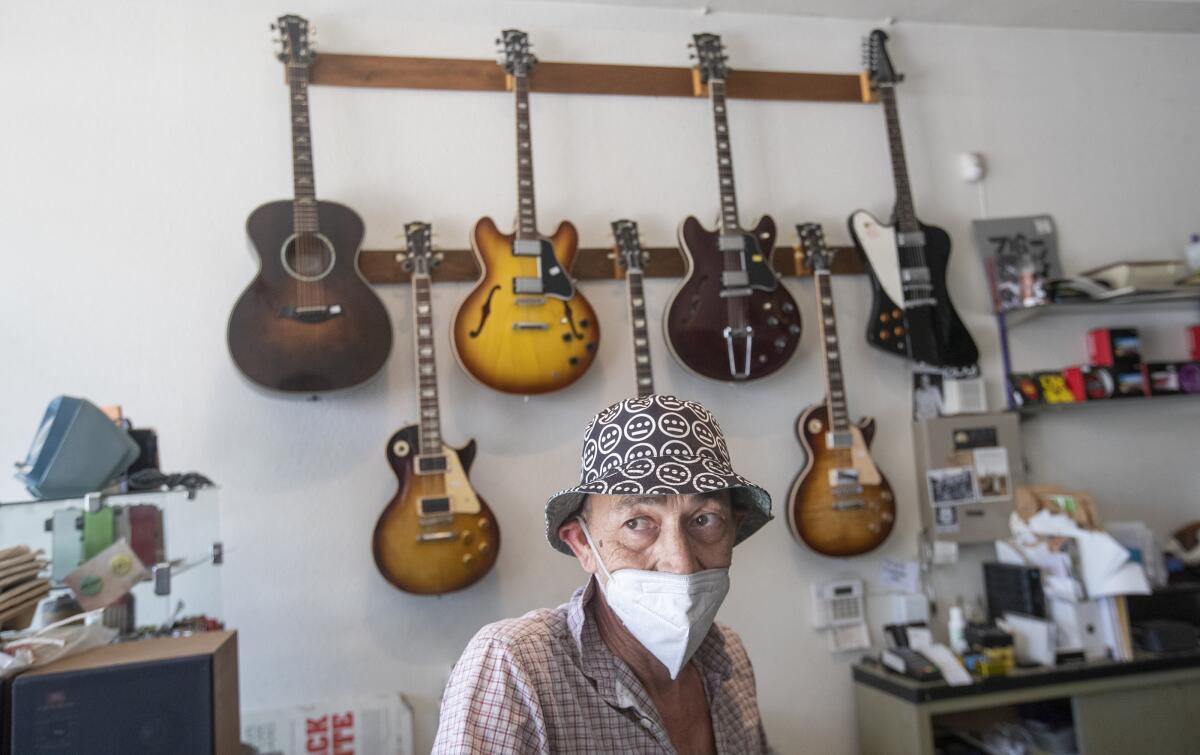
For Sherry Younge, the co-founder of The Artform Studio, a one-of-a-kind record store and beauty parlor on Figueroa Street, the loss of her in-person clientele during the pandemic has changed Artform’s role in the neighborhood. “We’ve helped a father cut his kid’s hair on video, we’ve helped clients do their own bangs at home,” she said. “But this is definitely hurting everybody. Just about the only thing keeping shops on the block going are grants like LISC. But Highland Park has been good about keeping people together through music.”
Younge is married to the soul and jazz composer Adrian Younge. Adrian and his manager, Andrew Lojero, are the main players behind the promoter ArtDon’tSleep and its spinoff Jazz Is Dead, which releases albums and produces concerts around Highland Park that often pair legends like vibraphonist Roy Ayers with contemporary live bands. As with every other venue in town, all those shows are on hold for now.
“If we weren’t releasing records, it would have driven me crazy. This is the first time in 17 years I’m not programming concerts,” Lojero said. “We’re all hanging tough, [but] we are definitely worried about being able to afford our studio. I’ve applied for loans and for grants and have yet to get approved.”
While COVID-19 has shut down some parts of his career, it’s also been a chance to assess preexisting issues in the music industry that the pandemic accelerated.
“We have to have a long-overdue conversation about what’s essential in music,” Lojero said. “How many independent venues will be left standing and how many are AEG and Live Nation going to buy up? Highland Park is a hub of independent musicians, it’s woven into the fabric of music here. But so many things — access, venues, funding — are stacked against us.”
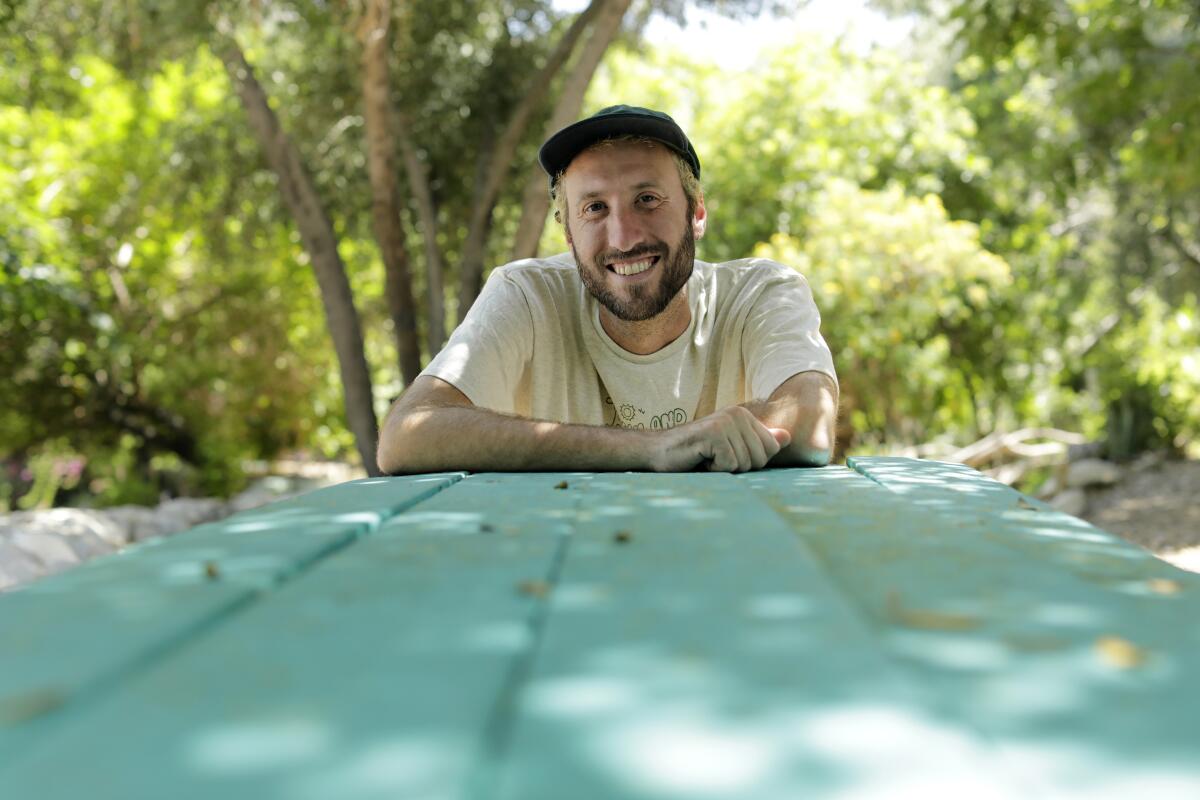
Some are already planning for the hard choices to come. Daniel Cook, the owner of Gimme Gimme Records, moved his shop to Figueroa Street in 2013 after nearly two decades in New York City. He’s fortunate that he can sell LPs online, but “it’s still a business where you touch everything, and it’s a bit nerve-racking being there,” he said.
The shop closed in March and reopened part time for the last three weeks, but has shuttered again as cases spiked. His revenue is down 50% from pre-COVID-19, which is “better than a lot of people but we’re not gonna have a good year. It’s not cheap to be down here, and if I can’t open, it makes sense to pull out. On my stretch of Figueroa, several businesses are already gone.”
Others, like the polyglot Now-Again label head and Rappcats record shop co-founder Eothen “Egon” Alapatt, are definitely sticking around. “I’m lucky that my landlord lives in my building, he’s 85 and has been there since the ’70s. I’m not going anywhere, but I’m sad for all the people who pay crazy rents, because there’s no way to make those margins during a downturn. It’s devastating,” he said.
Alapatt has been in the neighborhood for the better part of two decades, and played roles in everything from shepherding J. Dilla and Madlib’s considerable catalogs to running Rappcatts, a stoner-record-nerd’s dream boutique and event space on York Boulevard. He’s watched the gold rush of real-estate speculation that’s both fed and bled its music scene. “Most of the people I consider friends and neighbors here were brown people like myself, not the venture capitalists, not some blond white guy in Birkenstocks talking with his frat friends about buying a building,” he said.
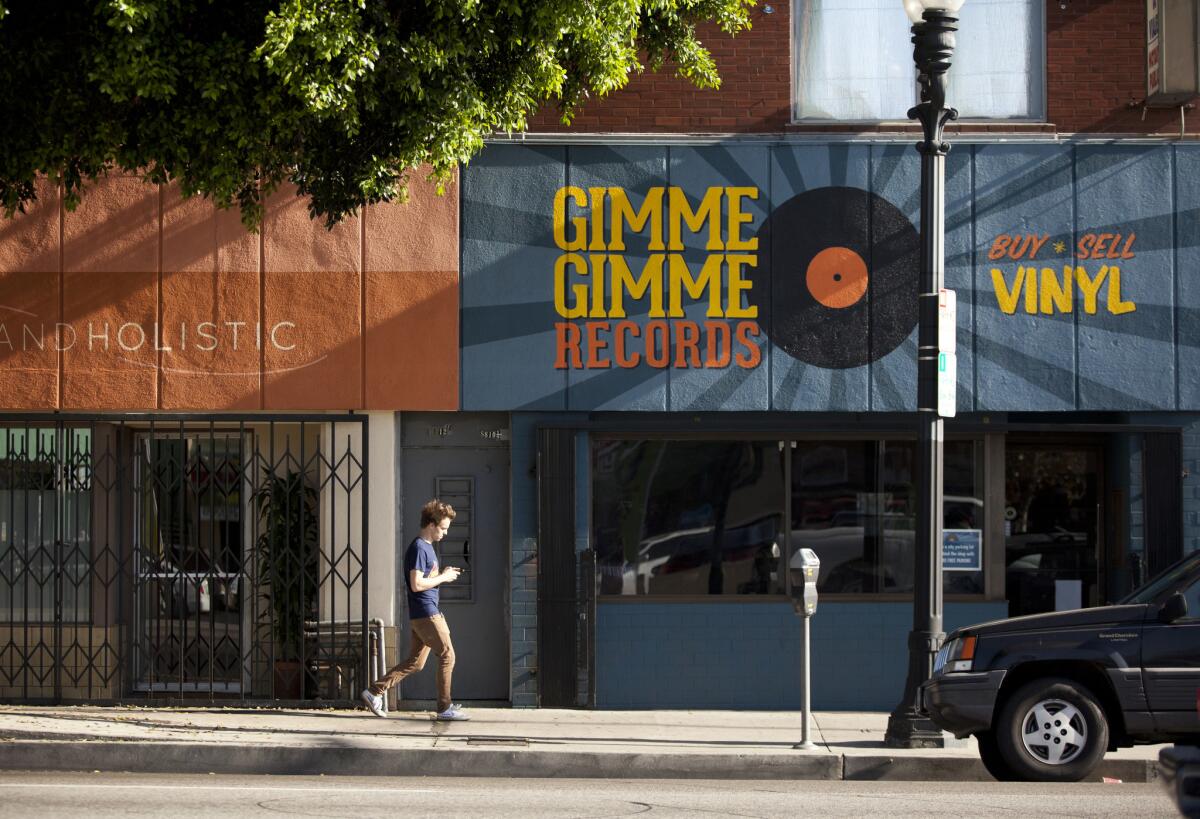
“Highland Park represents a culmination of L.A.: big money and real estate development, but also a community background of all classes and races, and that’s what’s gonna save it,” said Erik Nilsson, the owner of the recording-studio complex LemonTree (where Eilish chatted to The Times just before her sweep of the Grammys this year).
“My building is owned by a private equity firm, and they said about the pandemic, ‘I don’t know what you’re talking about, pay your rent.’ I had a 180-degree different point of view with our clients, though.”
Nilsson said he’s let some clients break leases early or renegotiate terms as needed to stay put. But the question remains if they can afford to stay here. “We’ve watched companies flip properties to each other. It’s a game of musical chairs and someone will get left out,” he said.
California failed to establish an effective coronavirus testing system early on, leaving it far behind — even now — in the fight against COVID-19.
Monkkonen has hope that SB-1410, a pending state bill offering landlords tax breaks for forgiving rent, might help keep tenants of all sorts in place. So far, residential rents aren’t dropping in big cities during the pandemic. “There was a bump in rental nonpayments in May that declined once benefits started filtering out. But there’s a big concern that mom-and-pop landlords will decide they don’t want to deal with tenants who can’t pay, and sell their buildings,” he said. “Times of crisis are good times to buy, and a lot of these distressed properties are bought up by private equity.”
If L.A. wants to preserve the culture scene in places like Highland Park, “the city has to make sure everyone knows what’s out there to help and how to apply,” he said. “The city has dumb approaches to helping the places that make it cool.”
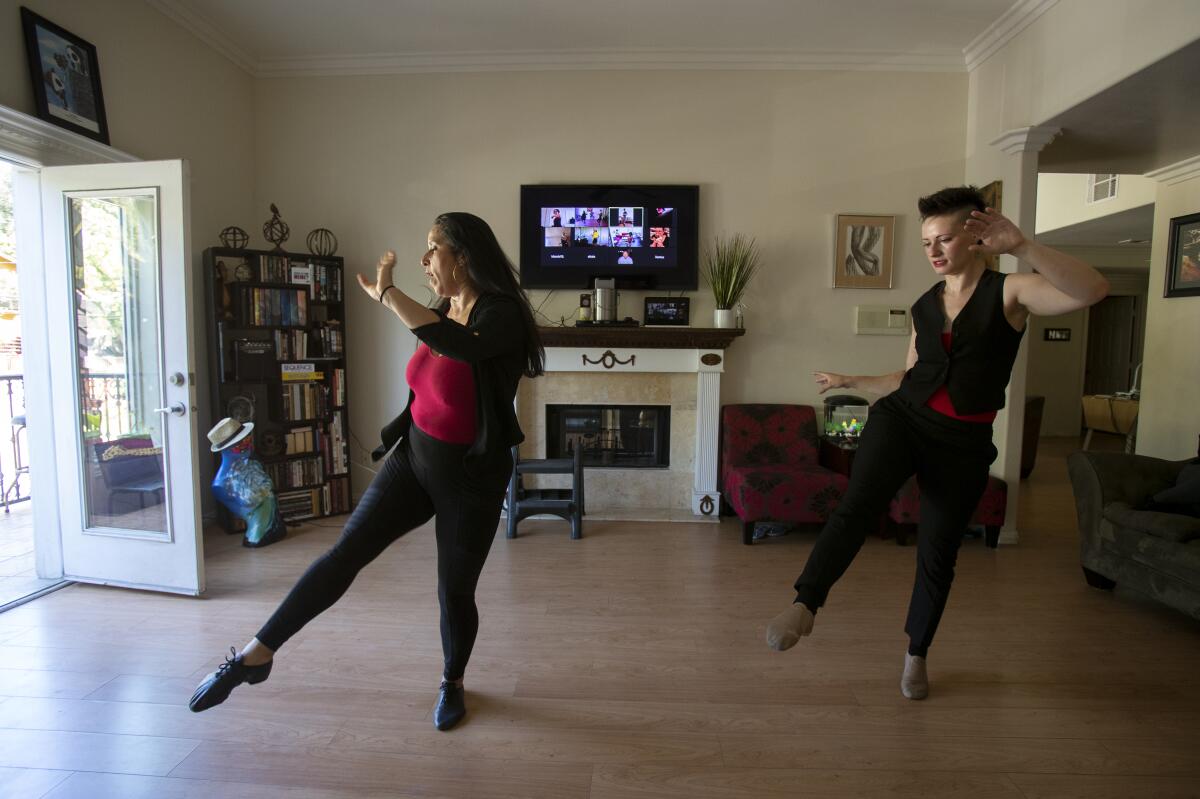
As the pandemic rolls on for, presumably, at least the rest of the year, Highland Park dance instructor Arlene Santos is at a loss.
“It’s completely shut down my business and there’s very little income right now,” Santos said. “I have hundreds of emails from people begging me to reopen but I can’t. The classes I teach require you to hold each other close. I would feel incredible guilt.”
Santos runs lessons from her Highland Park home (shared with three dancer roommates) and a Pasadena studio. She’s a founder of Queer Latin Dance L.A., a salsa and bachata workshop for same-sex and gender-non-conforming couples to work on their moves together.
Classes once held out of her home and studio that would draw 50 students a day have now moved entirely to Zoom, with much less income. Her staff and collaborators have put dance on the back burner for part-time jobs like delivering for UberEats.
“I don’t know if venues will survive,” she admits. “Our group comes to classes because they feel safe and comfortable, and that safety has been lost. They are people who are a huge part of my life and each other’s lives, and we’re not hanging out. It’s a really tough spot.”
Even beyond the pandemic’s economic crisis, Santos worries that COVID-19 has stripped some hope from her creative community. That, along with everything else, might take time to rebuild.
“Dance always made me really happy. When I’m teaching or performing, there are no worries or problems,” she said. “During COVID-19, it makes me sad that I can’t forget what’s going on. It’s changed for me, and I’m scared I’ll never get that back.”
More to Read
The biggest entertainment stories
Get our big stories about Hollywood, film, television, music, arts, culture and more right in your inbox as soon as they publish.
You may occasionally receive promotional content from the Los Angeles Times.
